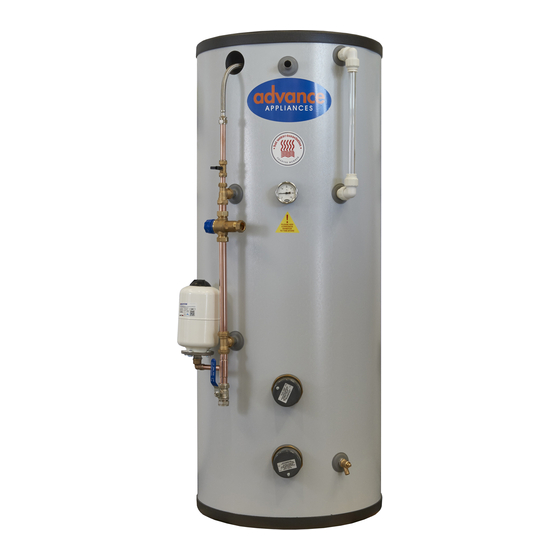Advance Appliances ETS 160 Kurulum ve Kullanım Kılavuzu - Sayfa 4
Su Isıtıcı Advance Appliances ETS 160 için çevrimiçi göz atın veya pdf Kurulum ve Kullanım Kılavuzu indirin. Advance Appliances ETS 160 8 sayfaları. Advance electric thermal store

947219 ADVANCE APPLIANCES 8pp A5_Layout 1 10/11/2015 14:41 Page 4
INST
ALLATION
The unit must be installed to meet current best practice by a person
competent to do so.
Incoming mains of 22mm with a pressure of 2 bar or above is recommended
for best performance. Lesser pressures/pipe diameters will compromise
performance; this must be taken into account as the decision rests with the
installer/householder.
Incoming pressures of more than 3 bar must be controlled at 3 bar by a
pressure reducing valve (Not supplied).
In hard water areas where concentrations exceed 200ppm a suitable scale
reducer must be installed. The choice is left to the installer to suit local
conditions. Chlorine levels must be below 200ppm.
If the cold service to the ballcock in the cold section is turned off or
disconnected it will not be necessary to fit an overflow, make sure that
the cold section has a 50mm depth of water. Cap the overflow connection
with a 22mm push-fit or compression end stop to prevent evaporation.
For additional protection a float switch can be used connected to a
motorised two port valve on the cold inlet. This is available as a kit from
Advance - please ask for AA0300.
If the overflow is connected it must be in line with current practice.
A metal overflow should be fitted. Push fit or solvent weld are not
recommended. Discharge must be to a safe point. We also recommend
that the ball valve is isolated even if an overflow is fitted.
Inhibitor must be added via the top of the store to manufacturers'
recommended dosage.
PIPEWORK
In order to comply with Part L Building Regulations it is necessary to
insulate any hot water (primary and secondary) pipework within one metre
of the cylinder. Guidance is given in the Table 5 (Page 20) of the 2013
Domestic Heating Compliance guide. Insulation values for the most popular
pipe sizes are reproduced below.
Pipe outside diameter
15
22
28
35
Maximum heat loss in W/m
7.89
9.12
10.07
11.08
